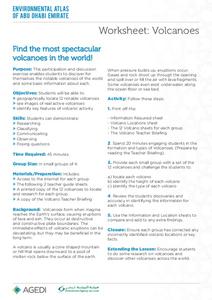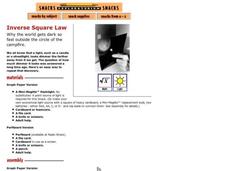Curated OER
The Old Man and the Sea: Guided Imagery
What do you imagine when you think of the sea? Put on some ocean sounds, close your eyes, and listen to a guided meditation based on the imagery from The Old Man and the Sea by Ernest Hemingway. After class members listen to...
Environment Agency - Abu Dhabi
Find the Most Spectacular Volcanoes in the World!
Heat things up in your earth science class with this collaborative lesson on volcanoes. After first being introduced to the different types of volcanoes and how they are formed, young geologists work in small groups to...
University of Wisconsin
Infiltration Test: Exploring the Flow of Water Through Soils
Soil scientists gain experience with an infiltrometer can to determine the infiltration rates at different locations on campus. If you are using the entire unit, the class has already analyzed water flow and soil types, so they should...
Curated OER
The Brain: Control Central
Students investigate the brain as the organ that regulates all of their physical, emotional, and cognitive responses. Some of the components of mental illness are examined inn this lesson.
Curated OER
Hinode Studies Loopy Sunspots!
In this sunspots and magnetic fields activity, learners read about the satellite images taken showing 'loopy' patterns from solar gases and the magnetic fields on the sun. Students solve 2 problems including finding the volume of a...
Curated OER
Animal Colors and Shapes
Learners investigate the natural characteristics of animals by completing a coloring activity. In this animal properties lesson, students investigate the reasons different animals have specific colors, and how it is essential for...
Georgia Department of Education
Living Things/ Nonliving Things
How can you tell if something is living or nonliving? Introduce a set of criteria which can be used to determine which things are alive and which are not. The class discusses the basic needs of all living organisms, checks out an...
Discovery Education
Sonar & Echolocation
A well-designed, comprehensive, and attractive slide show supports direct instruction on how sonar and echolocation work. Contained within the slides are links to interactive websites and instructions for using apps on a mobile device to...
Exploratorium
Inverse Square Law
The inverse square law is revealed when your class participates in this activity. They move a graph paper or perfboard square back and forth in a square of light to see how the intensity changes. You will definitely want to add this...
Curated OER
Replacing Missing Links in the Evolutionary Chain
Examine the evolution of various species of hominids from their earliest existence approximately 4.5 million years ago to today. In small groups, learners research one of the ten stages of hominid evolution and then create a poster and...
Curated OER
Energy for Earth: The Sun
Super science learners examine the sun's production of energy by the process of nuclear fusion. Hands-on activities make this lesson engaging for middle schoolers. The lesson is made up of four parts. Part I is an introduction to the sun...
NOAA
Biological Oceanographic Investigations – Call to Arms
How many simple machines does it take to make a robotic arm? An inquiry-based lesson explores that topic and challenges pupils to build a robotic arm that can stretch, turn, and more. A few questions help guide them in the...
Curated OER
Deep Blue Sea
Elementary schoolers identify the ocean floor in a geological sense. They create a presentation that highlights the key features of the ocean floor. This terrific lesson plan has excellent streaming video segments embedded in it, and the...
Curated OER
Reproduction, Day 2: Pregnancy
Nearly all high schoolers have seen pregnant women and may have questions about human development. Intended for secondary students with mild to moderate mental disabilities, this lesson defines the process of pregnancy in a...
Exploratorium
Polarized Sunglasses
Reflected waves of light move within a plane, and because of this, polarizing materials can reduce the glare our eyes see. This resource explains how to set up a demonstration of this effect. Consider it for use in your physical science...
Together Counts
Foundations of Wellness
You may be physically healthy, but what about mentally and emotionally? How is your social health? Kindergartners and first and second graders learn about the importance of maintaining their health in all aspects of their lives with a...
NOAA
The Oceanographic Yo-yo
How does chemistry help deep-sea explorers? Part four of a five-part series of lessons from aboard the Okeanos Explorer introduces middle school scientists to technologies used in ocean exploration. Groups work together to analyze data...
Curated OER
Oh Panther
Learners play a game that replicates the balance of prey and predators in an ecosystem. In this physical education lesson, students follow the instructions to play "Oh Panther!" Learners collect data regarding the game and discuss the...
Laboratory for Atmospheric and Space Physics
The Planets and Scale
Scholars gain an insight into the relative size of planets and distance between inner and outer planets with the help of informational text, a data table, and a series of four questions.
University of Colorado
Using Spectral Data to Explore Saturn and Titan
Saturn's rings are made of dust, ice, and solid chunks of material. Individuals use spectrographs in this final installment of 22 lessons to determine the atmospheric elements. They analyze spectrums from Titan's atmosphere and...
Curated OER
Pocumtucks in Deerfield
As part of a study of colonial and Native American history, class members focus on the beliefs and land use of the Pocumtucks, who settled near Deerfield, Massachusetts. Learners examine their beliefs about land use and ownership, the...
Curated OER
The Grapes of Wrath: QAR--Question/Answer Relationship
Chapter nine of John Steinbeck's The Grapes of Wrath provides the text for an exercise that asks readers to think deeply about the items the Joads left behind and what these items might represent.
National Gallery of Canada
Contemporary Reflections
Combine art and writing in a lesson about legends. After viewing Inuit art, class members examine their own cultural surroundings in order to write and visually represent a legend. Individuals are invited to take the creative reins when...
Chicago Botanic Garden
Nature Walk and Ecosystem Introduction
A food web has no organism higher than a tertiary consumer because there wouldn't be enough energy left to sustain them. The fourth installment in a seven-part series begins with a nature walk to get pupils thinking about their...

























